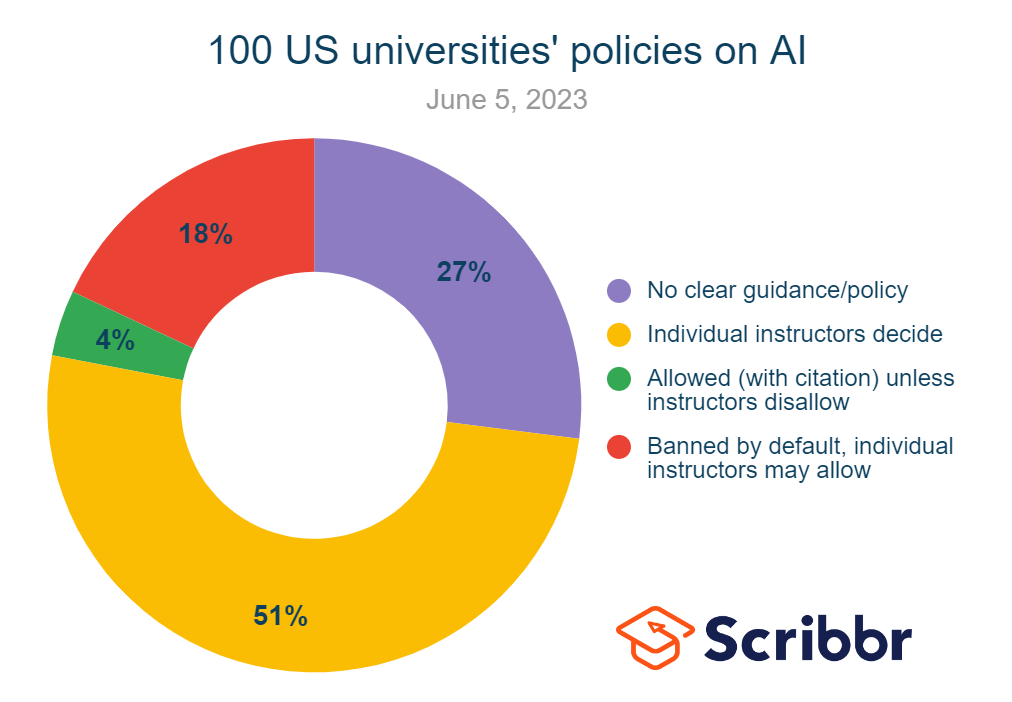Our research into the current guidelines of 100 top universities indicates that most don’t have definitive guidelines yet and that individual instructors ultimately decide what’s allowed in their classes. Specifically, we found four responses to AI writing tools from universities:
At 27% of universities, there seem to be no clear guidance or policy so far.
At 51% of universities, individual instructors decide their own policy for now.
At 18% of universities, the tools are banned by default unless instructors say otherwise.
At 4% of universities, the tools are allowed (with citation) unless instructors prohibit them.
 University stances so far
University stances so farAs explained above, even when there’s a default AI policy in place, individual instructors have the freedom to depart from it and decide what’s allowed in their classes.
The resources currently available from universities are mainly guidelines for instructors, not official policies. Instructors are advised to create their own rules and communicate them clearly to students in their syllabus and in class. The main approaches your instructor might decide on are:
Banning the use of AI writing tools for assignments: Instructors may decide that these tools are incompatible with the intended learning outcomes of your class and prohibit their use entirely. This is likely to be a common policy for now. Instructors may use AI detectors to enforce this rule.
Allowing AI writing tools in some cases: You may be told to use AI only for specific purposes (e.g., only for research, not writing), only for special assignments, or only when you ask permission. You may also have to cite ChatGPT (or whatever tool you used) and describe how you used it.
Allowing AI writing tools generally, when appropriately cited: Some instructors may decide to allow the free use of these tools in any assignment. They will usually still require you to cite them and possibly to describe in detail how they were used.
While it’s up to individual instructors to determine their policies, very few instructors right now will allow you to use AI writing tools freely without citing them. Universities generally agree that presenting AI-generated writing as your own work is plagiarism (or at least academic dishonesty).
Tip
If you’re unsure about the specific policy in your case, check your syllabus or ask your instructor. When asking, be specific about what use cases you’re interested in (e.g.,
“May I use ChatGPT to develop my research question?”—not just “May I use ChatGPT?”).
By default, it’s safest to assume that AI writing tools are not allowed until you know your instructor’s specific policy. The consequences of plagiarism and academic dishonesty can be serious, so make sure you know where you stand. It’s better to be safe than sorry.
List of university policies and guidelinesThe table below provides links to resources on the current policies or guidelines of 100 top US universities. You can also check out the data in more detail in our research spreadsheet.
In each case, we tried to find the most definitive guidance available from the university. Because this technology is developing quickly and universities are in the middle of a semester, they normally don’t have a definitive policy statement yet. Most commonly, we were able to find:
Resources for instructors, advising them on how to develop their own policy on these tools
Statements from faculty quoted in news articles
Statements from faculty in public forum discussions
The table is organized alphabetically by university name and divided into three tabs for ease of navigation. Just find and click on your university’s name. If you can’t find information on your university, it’s always best to ask your instructor directly or check your syllabus.

 University stances so far
University stances so far